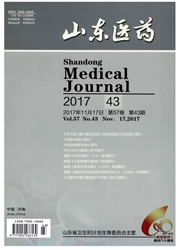

 中文摘要:
中文摘要:
目的检测不同活化形式的caspase-3在乳腺癌中的表达情况,探讨其在乳腺癌发生发展中的作用。方法采用免疫组织化学和原位杂交检测80例乳腺浸润性导管癌(IDC)、23例导管内癌(DCIS)、37例乳腺增生症和9例癌旁组织中caspase-3蛋白和mRNA表达、活性caspase-3表达,分析caspase-3与乳腺癌临床病理特征的关系。,结果(J)caspase-3mRNA在各组织中的表达无统计学差异(P〉0.05)。caspase-3蛋白在IDC、DCIS、增生症中的表达均高于癌旁组织(P〈0.05),IDC、DCIS均高于增生症组(P〈0.05)。②活性caspase-3阳性细胞指数、pro-caspase-3阳性细胞指数在IDC、DCIS、增生症中均高于癌旁组织(P均〈0.05),IDC、DCIS均高于增生症(P〈0.05),IDC和DCIS无统计学差异(P〉0.05),相同组织中的procaspase-3阳性细胞指数均明显高于活性caspase-3阳性细胞指数(P〈0.05)。caspase-3mRNA与蛋白表达在导管内癌和增生症组织中存在相关性(P〈0.05)。结论caspase-3在乳腺癌中普遍阳性表达,但其并非以活性casapse-3的形式存在,提示caspase-3活化障碍可导致乳腺癌肿瘤细胞凋亡异常。
 英文摘要:
英文摘要:
To investigate the expression of caspase-3 in breast cancer and its role in tmnorigeuesis. Methods A total of 80 cases of breast invasive duct carcinoma( IDC), 23 cases of ductal carcinoma in situ( DCIS), 37 cases of cyclomastopathy and 9 cases of tumor adjacent tissues were selected. The expressions of mRNA and protein of caspase-3 and actived caspase-3 were investigated using in situ hybridization and immunohistochemistry. The clinical signif- icance of easpase-3 was evaluated. Results No significant differences of the expressions of caspase-3 mRNA were found among every group(P 〉0.05). The expressions of easpase-3 protein in IDC, DCIS and cyclomastopathy were higher than those in tumor adjacent tissues(P 〈 0.05). The expressions of caspase-3 protein in IDC and DCIS were higher than those in cyclomastopathy(P 〈 0.05 ). The actived caspase-3 positive cell index(ac3i) and procaspase-3 positive cell index (pc3i) in IDC, DCIS and cyclomastopathy were higher than those in tumor adjacent tissues(P 〈 0.05 ). The ac3i and pe3i in IDC and DCIS were higher than those in cyclomastopathy(P 〈 0.05). No significant differences was found between IDC and DCIS( P 〉 0.05 ). The pc3i was higher than ac3i within every group (P 〈 0.05 ). There were correlations between the expressions of caspase-3 mRNA and caspase-3 protein in DCIS and cyclomastopathy(P 〈 0.05). Conclusions The expressions of caspase-3 protein in breast cancer are upregulated, but most of them are in the inactived form which indica- ted that failure of caspase-3 activation can lead to abnormal breast tumor cell apoptosis
 同期刊论文项目
同期刊论文项目
 同项目期刊论文
同项目期刊论文
 Effect of Chemokine Receptors CCR7 on Disseminated Behavior of Human T cell Lymphoma: clinical and e
Effect of Chemokine Receptors CCR7 on Disseminated Behavior of Human T cell Lymphoma: clinical and e Differential expression of decorin, EGFR and cyclin D1 during mammary gland carcinogenesis in TA2 mi
Differential expression of decorin, EGFR and cyclin D1 during mammary gland carcinogenesis in TA2 mi Correlation effect of EGFR and CXCR4 and CCR7 chemokine receptors in predicting breast cancer metast
Correlation effect of EGFR and CXCR4 and CCR7 chemokine receptors in predicting breast cancer metast Doxycycline inhibits the adhesion and migration of melanoma cells by inhibiting the expression and p
Doxycycline inhibits the adhesion and migration of melanoma cells by inhibiting the expression and p A pilot study on acute inflammation and cancer: a new balance between IFN-gamma and TGF-beta in mela
A pilot study on acute inflammation and cancer: a new balance between IFN-gamma and TGF-beta in mela 期刊信息
期刊信息
